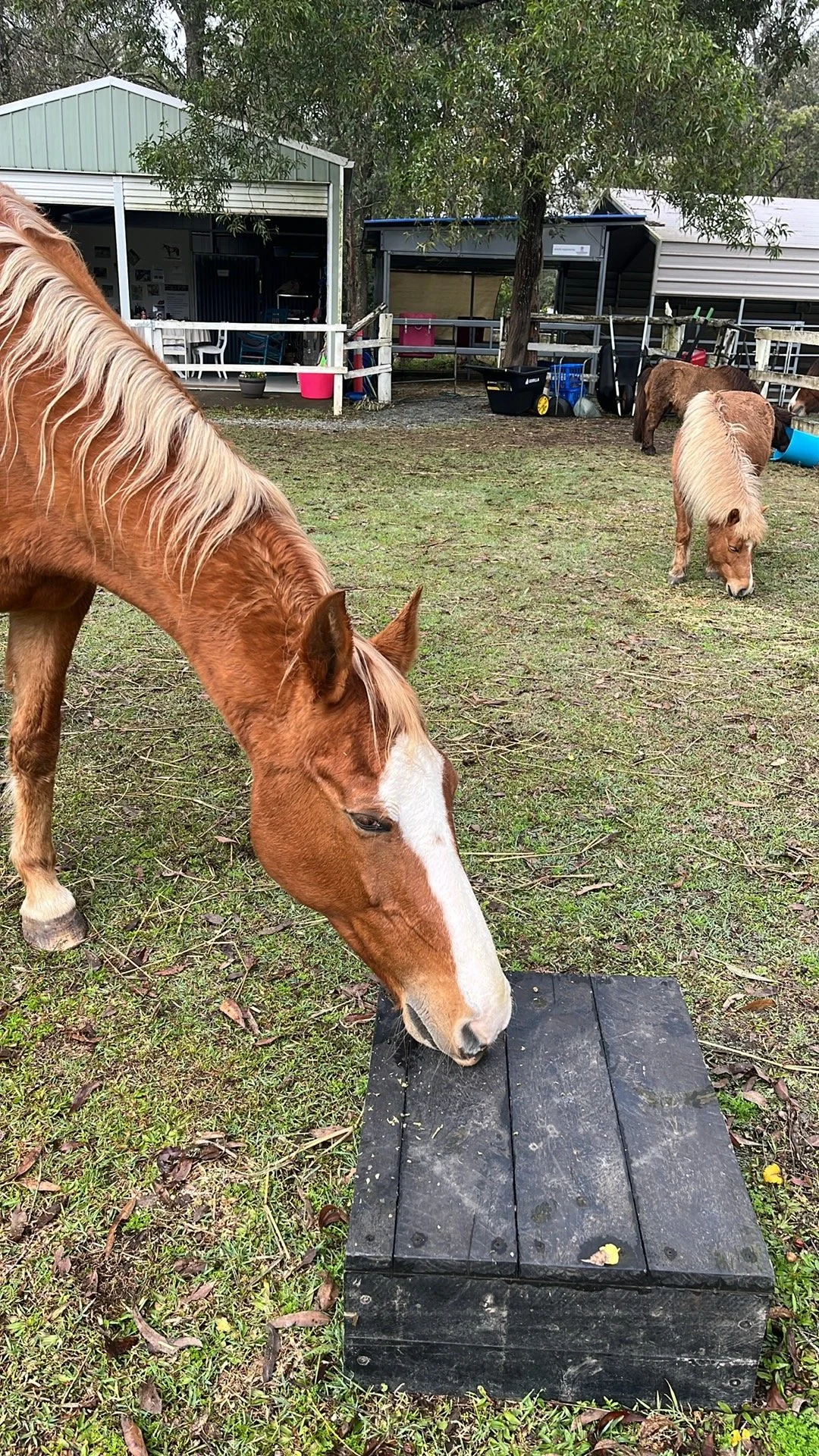Equine-Assisted Services
We are excited to announce that we have moved to a new space!
We offer private & NDIS clients a selection of non-riding Equine Assisted Services at an idyllic location in NSW Northern Rivers Region.
Shana’s approach integrates the healing power of the human-animal connection to support emotional and mental well-being.
Equine-Assisted Psychotherapy (EAP)
Purpose:
Emotional and psychological healing
Focused on treating mental health issues such as trauma, anxiety, depression, grief, PTSD, or relational issues.
Focus:
Therapeutic process involving emotional exploration, trauma processing, and behavioural change
May include non-verbal processing, relationship building with horses, and activities designed to evoke emotional insight
Equine-assisted therapy uses non-ridden horse interactions to promote emotional growth & healing. In this unique approach, clients engage in activities like grooming, leading, or observing horses. Integrating the presence and behaviour of horses into therapeutic work is particularly effective for individuals dealing with trauma, anxiety, depression, grief, emotional dysregulation, and relational difficulties.
Unlike traditional talk therapy, EAP relies on non-verbal communication, embodied awareness, and the therapeutic relationship with both the horse and the therapist.
At the heart of EAP is the horse’s ability to reflect human emotions and energy in the present moment. As prey animals, horses are acutely attuned to their environment and to the emotional states of those around them. This sensitivity allows them to respond authentically and without judgment, offering immediate feedback to the client’s emotional expressions, boundaries, and inner experience. In this way, horses act as mirrors—revealing patterns of behaviour, emotional blocks, and unconscious responses that might otherwise remain hidden.
Healing occurs as clients learn to build safe, trusting relationships with the horse—often for the first time experiencing a bond that is grounded in non-judgmental acceptance, respect, and presence. Working with horses fosters the development of core psychological skills such as:
Emotional regulation: Clients learn to calm their nervous systems and remain present.
Boundaries and assertiveness: Through activities like leading, grooming, observation of horse behaviour or simply being near the horse, clients practice setting and respecting boundaries—skills that are essential in all healthy relationships.
Self-awareness and insight: The horse’s reactions provide a direct and honest reflection, helping clients to explore how their emotions, energy, and communication impact others.
Connection and trust: Many people who struggle with trauma or relational wounds find it difficult to trust. Building rapport with a horse—an animal that requires mutual respect—can gently rebuild this capacity.
EAP is particularly effective as a therapy because it bypasses the need to verbalise painful memories. Instead, healing unfolds through embodied, somatic experiences that rewire the nervous system, cultivate safety, and restore a sense of agency.
Ultimately, equine-assisted therapy provides a compassionate, non-verbal, and deeply relational pathway to healing—empowering individuals to reconnect with themselves, others, and the world in a more grounded, authentic, and hopeful way.
Equine-Assisted Learning (EAL)
Purpose:
Personal development, education, and life skills
Builds self-confidence, leadership, communication, teamwork, and resilience
Focus:
Learning-based, goal-oriented sessions
Emphasis on skill-building, problem-solving, horse & self-awareness through interaction.
Examples of use:
NDIS participants wanting to develop essential life skills through hands-on interaction with horses. The program is flexible, strengths-based, and can be tailored to individual's support plan.
Young people needing support with emotional or social development
Women rebuilding confidence after life transitions or adversity
Equine-Assisted Learning is an experiential, strengths-based approach to personal development and life skills training that engages clients in purposeful interactions with horses. Rooted in evidence-based learning theory and grounded in the natural behaviour of horses, EAL offers individuals and groups a unique opportunity to build self-awareness, social & communication skills, confidence & emotional resilience.
Unlike riding programs, EAL sessions are ground-based and focus on structured, goal-oriented activities involving the horse. Through these interactions, participants receive real-time, honest feedback from the horse—an intuitive and highly sensitive animal that responds to human behaviour, energy, and body language. Because horses live in the present moment and operate within clear social structures, they naturally encourage participants to reflect on their own leadership, trust, boundaries, and emotional regulation.
Key Benefits of EAL:
1. Emotional Regulation and Wellbeing
Working with horses helps clients learn to identify, regulate, and express emotions in healthy ways.
Horses respond to human body language and energy, offering immediate, calming feedback.
Supports clients with anxiety, trauma, or emotional dysregulation to build confidence and stability.
2. Communication and Social Skills
EAL activities encourage non-verbal and verbal communication, active listening, and respectful interaction—both with the horse and others.
Promotes self-expression and interpersonal development, especially for those with ASD or social anxiety.
3. Confidence, Independence and Self-Awareness
Building trust and connection with a horse promotes self-esteem and a sense of agency.
Clients develop independence by engaging in tasks that require planning, boundaries, and problem-solving.



